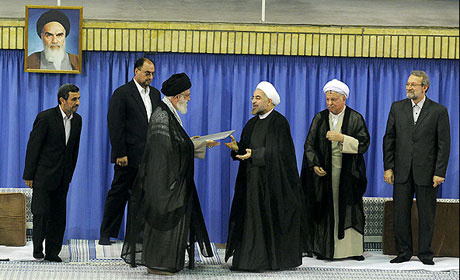Supreme Leader Endorses Presidential Decree of Hassan Rouhani

The ceremony kicked off in the capital, Tehran, at 17:00 local time (12:30 GMT) on Saturday in the presence of senior Iranian state and military officials as well as foreign dignitaries.
The ceremony started with Interior Minister Mostafa Mohammad Najjar's report on the trend of the election from the start of arrangements to the announcement of final results.
Then, the Supreme Leader's Chief of Staff Golpayegani read the text of the decree to the public.
Later in the ceremony, the Supreme Leader granted the presidential decree to the country's new President Hassan Rouhani.
The ceremony was, then, addressed by the new president and the Supreme Leader.
Also, delegates from 52 states will attend Rouhani's swearing-in ceremony at the parliament tomorrow.
Iranian Foreign Ministry Spokesman Seyed Abbas Araqchi said on Thursday the foreign dignitaries will come from 52 countries, the United Nations in addition to two special guests.
Eleven presidents, eight vice-presidents, two prime ministers, three deputy prime ministers, seven parliament speakers and 11 foreign ministers will represent their governments in the August 4 ceremony, Araqchi said.
He said that composition of delegations from 12 countries have not been specified yet.
The Foreign Ministry spokesman said that although officials from some other countries are willing to attend the ceremony, Iran cannot accept more participants due to the limited space of the parliament hall.
Reports also said that former EU foreign policy and security Chief Javier Solana will attend the ceremony.
The special guests will be former Malaysian Prime Minister Mahathir Mohamed and Representative of United Nations Secretary-General Ban Ki-moon to Afghanistan, Jan Kubis.
Rouhani emerged victorious in Iran's June 14 presidential election, which was marked by a high voter turnout. He won 50.7 percent of the votes.
The Interior Ministry put voter turnout at 72.7 percent.
Rouhani has been a representative of Ayatollah Khamenei at the Supreme National Security Council (SNSC) for nearly two decades. He is also a member of the Expediency Council and the Assembly of Experts, and was the president of the Expediency Council's Center for Strategic Research until today.

